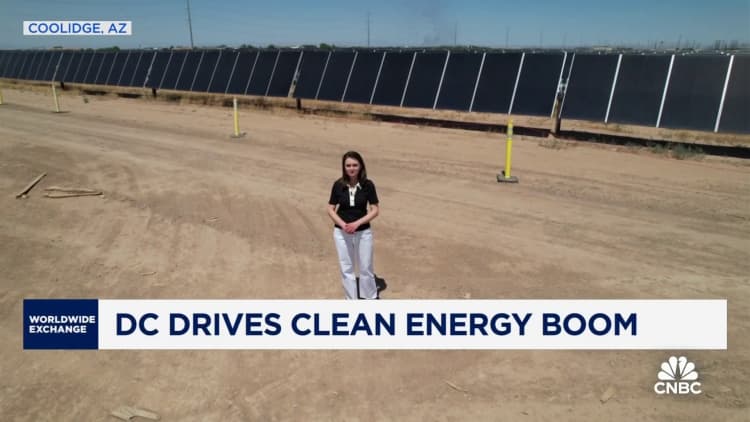- Renewable energy developer Orsted announced on Thursday won a $680 million investment from JPMorgan for two of its energy projects, including Eleven Mile Solar near Coolidge, Arizona.
- Eleven Mile Solar has more than 857,000 solar panels and 2,000 battery cubes, and will be able to power roughly 65,000 homes.
- The majority of the power generated at Eleven Mile Solar will go to a new Meta Platforms data center in Mesa, Arizona.
- The Inflation Reduction Act has spurred clean energy investment in the U.S. by extending existing tax credits and introducing new incentives, including the ability to sell tax credits on the open market.
Danish renewable energy developer Orsted won a $680 million investment from JPMorgan in two U.S. projects as incentives from the Biden Administration’s signature climate law — the Inflation Reduction Act (IRA) — spur a clean energy boom in the U.S.
JPMorgan will provide tax equity financing for Orsted’s Eleven Mile Solar Center, a 600-megawatt solar and storage project near Coolidge, Arizona, and the 250-megawatt Sparta Solar project in Mineral, Texas.
Eleven Mile Solar, which includes more than 857,000 solar panels and 2,000 batteries from domestic manufacturers First Solar and Fluence, respectively, as well as tracking systems from Nextracker, qualifies for a one-time investment tax credit for the storage system, as well as an annual credit from a production tax credit for the solar array. Both credits were extended under the IRA.
Clean energy projects have relied on tax equity partnerships for years. Put simply, large financial institutions provide part of the financing for a renewable energy project, in exchange for the project’s tax credits. Developers themselves rarely have high enough tax bills, so a partnership allows them to monetize their credits.
But the partnerships are complex and the markets are limited. Smaller developers don’t always have the means to enter into these partnerships, and the appetite from large financial institutions to take stakes in renewable energy projects is limited.
The IRA sought to change that by adding in a provision allowing the credits to be transferred to a third party, creating a new pool of potential capital from corporations looking to offset tax bills. The project developer can either sell the credits themselves, or the tax equity partner — in this case JPMorgan — can decide to sell the credits to another party.
Prior to the IRA, the tax equity market was between $18 billion and $20 billion per year, according to the American Council on Renewable Energy. That’s “[s]till far short of what is needed in the post-IRA clean energy investment landscape,” the investment bank Evercore ISI noted. The bank estimates the potential market for tax credit transfers hitting $47 billion in 2024, and rising to more than $100 billion annually by 2030.
“This is the first time we’ve been able to do something like this…and it really opens the doors for a lot more corporates and companies with tax liability in the United States to come in and help support clean energy projects,” Melissa Peterson, head of onshore and origination at Orsted, told CNBC. “It’s really a unique structure that we hope to replicate over and over again.”
Construction at the $1 billion Eleven Mile Solar site began in January 2023 and, once operational later this year, it will be able to power roughly 65,000 homes. Two-thirds of the power will be used for a new Meta Platforms data center under construction nearby. Orsted is selling the power to Salt River Project — the local utility — who’s then selling it to Meta.
Boston Consulting Group estimates that between 2022 and 2030 data center electricity consumption will more than triple, requiring the same amount of power as 40 million households by the end of the decade. This comes on top of load growth from increased use of electricity, meaning U.S. power demand is now growing significantly for the first time in decades.
“We’ve been working in the United States for over 10 years, and this is probably the best time as a renewable energy developer to be working here in the U.S.,” said Orsted’s Peterson. “We see tons of opportunity with the increasing demand we’re seeing from reshoring manufacturing, big tech companies, paired with things like the Inflation Reduction Act, paired with lots of corporates who have ambitious climate targets.”
“We really see this as the pinnacle of opportunity for us,” she added.
– CNBC’s Harriet Taylor and Van Applegate contributed reporting.











